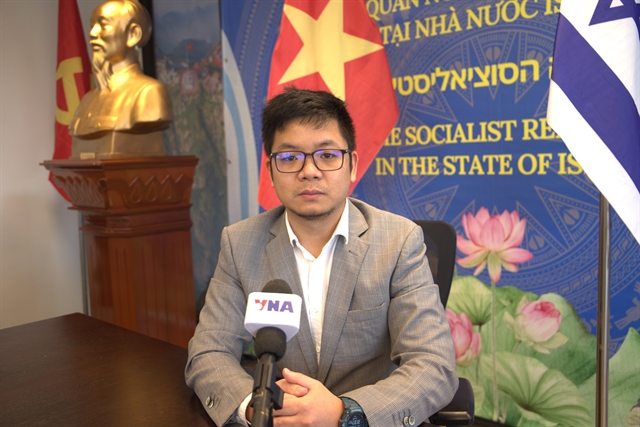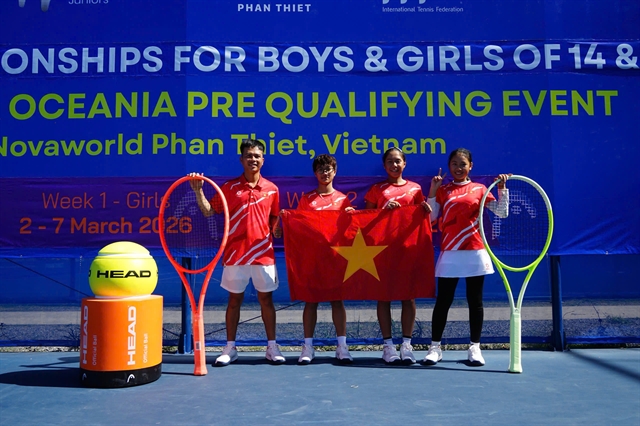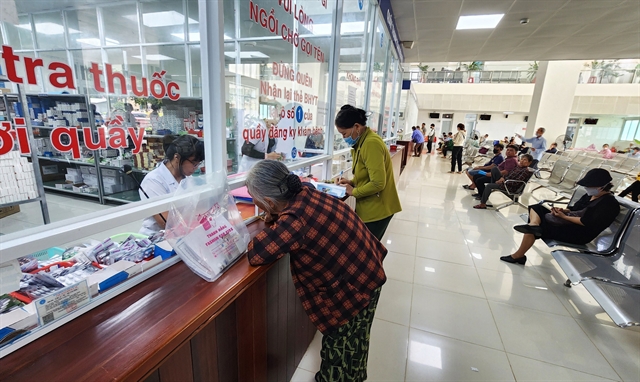 Opinion
Opinion
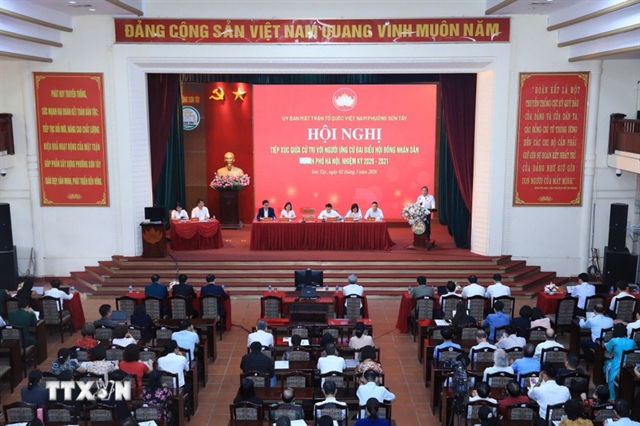
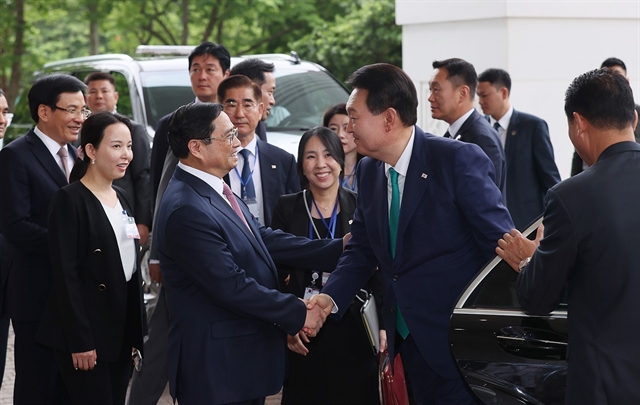 |
| Prime Minister Phạm Minh Chính on June 23 has a meeting with President of the Republic of Korea Yoon Suk Yeol in Hà Nội on June 23. VNA/VNS Photo Dương Giang |
Ngoc Nguyen*
It is no exaggeration to say that relationship between Việt Nam and the Republic of Korea is one of the most comprehensive and fastest-growing external relations of Việt Nam. It took only three decades after the establishment of diplomatic relations to upgrade their bilateral ties to a Comprehensive Strategic Partnership. Interestingly, among the countries joining the Western camp in the Việt Nam war, the ROK was the last to establish diplomatic relations with Việt Nam, but managed to become the first CSP. The Republic of Korea is also the first middle power reaching such a high level of partnership with Việt Nam.
Strong commitments and substantial implementation
Based on the remarkable achievement of Việt Nam – ROK collaboration over the past three decades, the upgrading to Comprehensive Strategic Partnership marked a new milestone in the relationship between the two countries. The Joint Statement on CSP opened up many opportunities to deepen their bilateral cooperation in almost all areas, ranging from economy to science and technology, defense and security, education and people-to-people linkages.
During the first year of the CSP, the Vietnamese and Korean leaders demonstrated their strong commitment to generating a breakthrough in the national development of each country, as well as in the bilateral relationship. President Yoon Suk Yeon’s state visit to Việt Nam in June 2023 was a great success and an important step to promote substantial implementation of the CSP. President Yoon was welcomed with the highest ceremony for a state visit and was received by all four Vietnamese top leaders which reaffirmed a high level of political trust between Việt Nam and Korea. During his visit, representatives of 205 Korean enterprises accompanied him to exchange with Vietnamese counterparts on the opportunities for business community. The two countries reached significant agreements to promote large-scaled infrastructure projects through the Economic Development Promotion Facility (EDPF) and to increase bilateral trade to US$ 150 billion by 2030. The two sides also took a new step to strengthen collaboration in scientific research through the Việt Nam – Korea Institute for Science and Technology (VKIST) and signed a Memorandum of Understanding on maritime security cooperation.
Apart from President Yoon’s visit, there were several other high-ranking delegations and a number of ministerial meetings from both countries. Chairman of Việt Nam’s National Assembly Vương Đình Huệ held talk with ROK counterpart Kim Jin-pyo during Mr. Kim’s official visit to Việt Nam in January 2023 and discussed the key directions of bilateral cooperation, particularly the collaboration between Việt Nam and Korean lawmakers. Two Vietnamese Politburo Members General To Lam, the Minister of Public Security, and Professor Dr. Nguyễn Xuân Thắng, the President of Hồ Chí Minh National Academy of Politics and Chairman of the National Theory Council, visited ROK in April and October 2023 respectively. General To Lam discussed with the ROK counterpart Mr. Lee Won Seok measures to foster a proactive combat against transnational crimes such as human trafficking, environmental and high-tech crimes, in order to ensure safety and security for peoples. The recent visit by Professor Dr. Nguyên Xuân Thắng highlighted a new level of party-to-party relations as one of the most important dimensions in the bilateral political ties. While reaffirming Vietnamese’s policy to maintain good relations with Korean political parties, including the ruling People Power Party, Professor Thắng called for more in-depth exchanges between policy-makers and scholars to accelerate progress of both countries in semiconductor industry, digital transformation, green growth, among others.
Besides the bilateral cooperation in practical fields, regional cooperation is an integral part of Việt Nam – ROK relations. Việt Nam has been the country coordinator of ASEAN – ROK relations since 2021 and has played a constructive role in synergizing the key initiatives of both sides. Less than one year after ROK’s announcement on the Korea – ASEAN Solidarity Initiative (KASI), in September 2023 ASEAN and ROK adopted a Joint Statement articulating the key directions of their cooperation in accordance with the four priorities of the ASEAN Outlook on Indo – Pacific (AOIP). Having coordinated the process, Việt Nam helped synergise the two grand initiatives AOIP and KASI to mobilize adequate resources for their operationalization. In November 2023 Việt Nam will host the ASEAN – ROK Day in Hà Nội as another step towards the establishment of ASEAN – ROK Comprehensive Strategic Partnership next year. In other words, Việt Nam can be seen as the gateway for ROK to Southeast Asia, given the achievement of bilateral cooperation. Under VietNam ’s coordinatorship, the bilateral CSP between Việt Nam and ROK also served as a catalyst for deepening ROK’s engagement with the region.
Ways forward
The Comprehensive Strategic Partnership gave a new momentum for bilateral cooperation between Việt Nam and ROK. However, the complex regional and global landscape continues to disrupt countries’ development. Geopolitical competition, emerging security challenges and potential hot spots have negative impacts on the world economy in general, as well as on individual countries. Due to these factors, during 8 months of 2023 from January to August, Việt Nam’s export to ROK decreased by 7.3%, while Việt Nam’s import from ROK decreased by 23.2%. Although Việt Nam’s total export has recovered after September and is expected to increase in the fourth quarter, it is still hard to be sure of a sustainable growth. These circumstances require both sides to double their efforts in implementing the CSP effectively through the bilateral and multilateral mechanisms.
In the bilateral mechanisms, Việt Nam and ROK need to work more closely to advance their development priorities. The main focus should be the transformation of Việt Nam’s manufacturing industry into a sustainable and innovative one. Localisation of manufacturing will help reduce VietNam ’s trade deficit with ROK, and also ensure the supply chain resilience amid disruption. Technology transfer and capacity building should be conducted in parallel. The focus of capacity building should be re-oriented from vocational training which was enough only for assembling industry into building human resources for innovative sectors such as semiconductor, renewable energy, artificial intelligence.
Vietnamese and ROK government took bold steps to intensify collaboration between business communities of the two countries. However, Korean investors should have more engagement with local people in order to tap the potential of local resources while ensuring sustainability. Since our two countries are striving for green growth and sustainable development, Việt Nam and ROK need to encourage exchanges on best practices and technology of circular economy, low-carbon manufacturing and agriculture, as well as renewable energy.
In the multilateral mechanisms, Việt Nam and ROK should synergize the bilateral CSP with the forthcoming ASEAN – ROK Comprehensive Strategic Partnership. ROK’s support to Việt Nam’s regional initiatives, particularly the upcoming ASEAN Future Forum in 2024, will reaffirm the joint commitment to strengthening ASEAN – ROK engagement. On its part, Việt Nam, as the country coordinator, can help ROK promote joint projects under the AOIP and KASI. For instance, cooperation on Smart Cities Network, confidence-building measures at sea, urban management can be some of the areas of common interests.
Taking into consideration the Mekong delta as one of the most pressing issues of Southeast Asia today, Việt Nam and ROK should step up sub-regional cooperation in areas such as water resource management, adaptation to sea level rise and salt intrusion, sustainable agriculture and fishing. The downstream countries in Mekong delta wish to have more projects similar to the pilot project funded by the Korea World Bank Partnership Facility helping farmers apply IoT technology to grow rice in a smarter way. With support from ROK, local communities can have more knowledge and experience to address the issues in the Mekong subregion. Even though official meetings cannot be convened between Mekong countries so far, joint projects should be continued to improve the quality of life for local people.
At the global level, Việt Nam can join hand with ROK to strengthen the role of United Nations and international law, including the UNCLOS 1982. Two countries should coordinate more closely in the multilateral fora, particularly those focusing on peace and sustainable development. The two sides should explore opportunities for collaboration in peace-keeping operations and in tackling the global issues such as health and food security. Cooperation between Việt Nam and ROK in convening the P4G Summit in 2025, among other fora, is expected to provide more innovative solutions for the common challenges facing the world today.
*Dr. Ngoc Nguyen is a research fellow at the Institute for Foreign Policy and Strategic Studies. The opinion expressed in the article is her own viewpoints.



